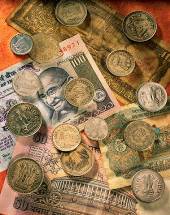 | « Back to article | Print this article |
 Avinash Dixit, John J F Sherrerd '52 University Professor of Economics, Princeton University, is a pioneer of the game theory and a major influence on Nobel laureate Paul Krugman's acclaimed work on international trade. Dixit, who spoke at the Delhi Economics Conclave on December 14, in an interview with Business Standard, talks about importance of collective action and social ostracism in fighting corruption. Edited excerpts:
Avinash Dixit, John J F Sherrerd '52 University Professor of Economics, Princeton University, is a pioneer of the game theory and a major influence on Nobel laureate Paul Krugman's acclaimed work on international trade. Dixit, who spoke at the Delhi Economics Conclave on December 14, in an interview with Business Standard, talks about importance of collective action and social ostracism in fighting corruption. Edited excerpts:
You have said people should take the initiative in rooting out corruption, instead of waiting for the maa baap sarkar. But isn't it true when a government official asks me for a bribe, I am better off if I pay it?
Exactly.
Individuals cannot fight corruption.
But the Indian business community can do something about it. If no one gives a bribe, what would the government official do?
You need collective action and businessmen who refuse to cooperate should face the threat of ostracism.
They should know if their fellow businessmen find out, they would be out of business.
The cost of the corruption coming to light is much bigger than the benefit from a single contract.
The present day Somalia has a similar system to enforce contracts. Also, there were similar societies in the past. What is the likelihood of India having such a system to fight corruption?
There were many places with institutions that were exactly of this nature; the threat of sanctions by fellow businessmen was there. Indian businessmen and business school professors should see that this deserves more serious study.
It makes little sense to argue such a system would never work in India.
Why not look into it and see what the chances are? I am not offering this as a ready solution or as a ready package.
Independent institutions like the central banks in the western world are more efficient and less corrupt than politically-controlled institutions. Do you think an independent body like the Lok Pal is likely to be more effective in fighting corruption?
The answer to this depends on the specifics of the case and how these are likely to be implemented. I am not an expert on India.
But yes, when an institution is independent, often, there is less room for corruption.
Schemes like the Mahatma Gandhi National Rural Employment Guarantee Scheme are quite popular in India; people think of these as a cure for poverty and unemployment. Do you think such policies are inefficient and lead to ample opportunities for corruption?
Again, the answer to such questions are dependent on specific details. Many countries have unemployment compensation schemes.
Sometimes, these are purely redistributive schemes.
When you have programmes that are purely redistributive, these redistribute wealth at too great a cost.
When you make public funds available, people would line up; you are smuggling in corruption through the backdoor.
It is argued the MGNREGS transfers money from taxpayers to workers who often work on worthless projects.
Yes. Remember, during the Great Depression, schemes of exactly the same kind put the unemployed to work. But in principle, you can design decent infrastructure projects.